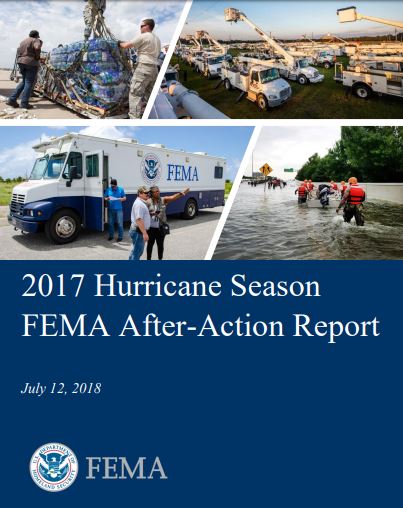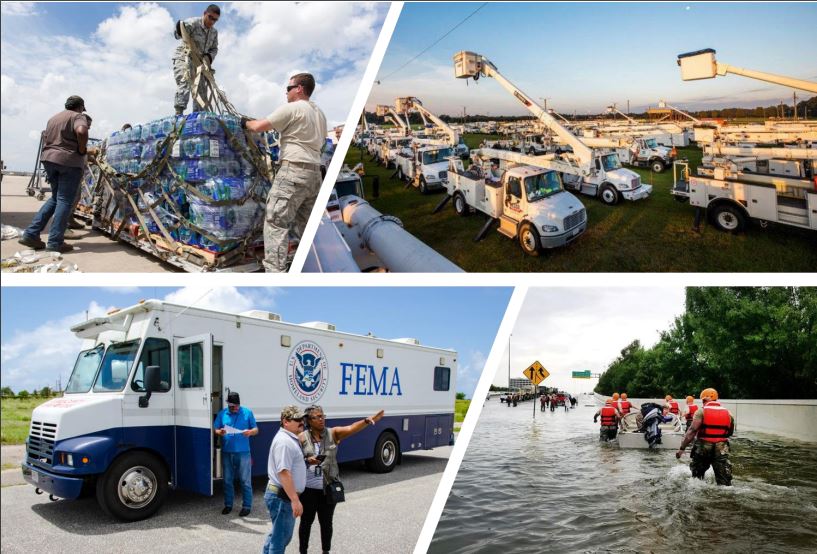Selection from the cover of new FEMA report urging more private-sector disaster response. (Source: FEMA.gov)
By Jonathan Larsen
The Federal Emergency Management Agency (FEMA) report released late Thursday is making headlines by taking responsibility for how the agency failed Puerto Rico in its response to Hurricane Maria. The 2017 after-action report on the 2017 hurricane season concludes that FEMA failed to anticipate several problems it would face in the event of a catastrophic storm coming quickly on the heels of other natural disasters.
Although the report refers to the “exceptionally active” season of 17 named storms, it does not refer to climate change or recommend measures to fight or mitigate it. In addition, the report does not contemplate increased funding for FEMA, which might alleviate many of the problems it identifies.
Instead, the solutions FEMA envisions come largely from FEMA outsourcing its role to local governments and to private business. Although the report cites Puerto Rico’s financial woes, it does not address how other local governments might fund disaster preparedness, let alone recommend tax or other revenue increases to do so—even though lack of disaster preparedness historically proves much more expensive.
The report subtly but unmistakably echoes the contours of what Naomi Klein has called “disaster capitalism”—the pivot to privatization of government functions in the wake of catastrophe. The report says, “closer partnerships with the private sector are crucial.” It says its “new approach should account for the capabilities of the private sector.”
Although the report outlines ways the government can improve and streamline its own performance, it lays the fault for private-sector shortcomings also at the government’s feet. The report notes that $3 billion was committed over 1464 contracts during a three-month period during and after Maria—compared to an average of $1.3 billion annually beforehand. The vast increase in reliance on the private sector, however, is never connected to the shortcomings in the response.
to the shortcomings in the response.
The report itself does not grapple with some of the most notorious private-sector failures during Maria. There is no mention, for instance, of Whitefish, the tiny Montana company that won a $300 million contract. And the report acknowledges a universal problem with relying on the private sector in an emergency: “Most local contractors also were disaster survivors.”
When the report does address private-sector failings, the blame is placed on government. In one example cited by the report, “shipping containers often arrived in Puerto Rico labeled simply as ‘disaster supplies’,” forcing relief workers to spend time to unpack and inventory the containers. The fault for this is placed on FEMA for not requiring the company to upload more precise shipment information.
The report also says that, “FEMA faced challenges with the contracting process due to the number of newly hired contracts,” but instead of recommending that FEMA streamline the process by reducing reliance on
contractors, the report’s solution is to, “Increase transportation planning, management, and contract support capacities.” In other words, hire more FEMA workers not to manage emergencies, but to manage private-sector contracts for emergencies.
Increased spending is justified in at least one section of the report. Rents for emergency housing were authorized at 200% above fair market value in Puerto Rico. And at 300% above fair market value in the Florida Keys.
Follow Managing Editor Jonathan Larsen on Twitter.
And follow TYT Investigates on Twitter, Facebook, and YouTube to stay on top of exclusive news stories from The Young Turks.


Comments
Thanks! And, yes, there remains a lot to be uncovered regarding what Wall Street sold to Puerto Rico, no doubt
This is an excellent report. I agree that Naomi Klein’s DISASTER CPITALISM seems to be in play here, in the recommendations that FEMA’s role, instead of preparing for coming disasters, be relegated to managing private companies which would be hired to do the work.
This also reflects a burgeoning Republican policy of contracting with private companies to provide government services rather than directly providing such services as has been the tradition in the past. Bush managed to contract services for providing housing for military forces in Iraq, then wanted to privatize the military. There were even attempts made to privatize state welfare programs until Clinton decided that this was one area that should remain under the state. Seems to me that the whole purpose of the Republican Party, especially now that Trump is in charge, is to get government out of the busiiness of taking care of citizens, and leave it in the hands of businessmen who will make a profit from it. As Bush put it, it is not the responsibility of the government to provide services, but to see to it that services are available.
Perhaps the Young Turks team would be interested in looking into the reason Puerto Rico is in such a bad financial state in the first place. Hint: look at Wall Street selling worthless derivatives to Puerto Rico pension funds, etc. Yet Puerto Rico’s status does not allow it to have any say-so as to how the problem should be resolved. U.S. citizens are appointed to manage Puerto Rico’s affairs as though the citizens there were a bunch of retarded, incompetent beinegs incapable o making intelligent decisions on their own. Yet we refuse to grant them citizenship. Puerto Rico’s entire situation needs to be looked at with fresh eyes, and a new and FAIR adjustment needs to be made where this population is treated with the full human rights and freedoms that the rest of us have, either as a state with full Statehood privileges or as an independent nation.
Keep up the good work. I love TYT. You are a breath of fresh air.